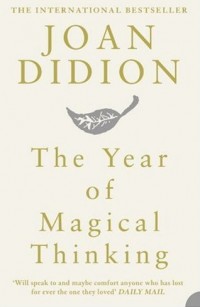Life changes fast. Life changes in the instant

The Year of Magical Thinking
by Joan Didion
Since discovering Didion last year, I have been eager to read more of her work, and where better to start than her famous memoir of the year following her husband’s death? Thankfully my book club agreed and we picked it for our February meeting.
This book wasn’t quite what I expected. I thought it would be very slow and contemplative, so I started it well ahead of book club. But actually I sped through it, I might almost call it gripping. The book starts with Didion’s husband John Gregory Dunne dying of a sudden heart attack. But at the same time their daughter Quintana was in intensive care fighting pneumonia, so Didion couldn’t let herself fall apart or retreat into herself. She dealt with this odd delay in her grief by writing about it, then and there.
“Life changes fast. Life changes in the instant. You sit down to dinner and life as you know it ends.”
This is very much a memoir of that specific year in Didion’s life, not of her life before. Nor is it about her husband, though obviously memories of him do feature, but only in relation to Didion experiencing them resurfacing, which often results in some of the book’s more moving moments. She will mention in a very matter-of-fact way that she can no longer drive down certain streets or let herself see certain landmarks because the memories they recall threaten to break her, and it is only when you think about what she has said that you realise how close to the edge she is.
“One day when I was talking on the telephone in the office I mindlessly turned the pages of the dictionary that he had always left open on the table by the desk. When I realized what I had done I was stricken: what word had he last looked up, what had he been thinking? By turning the pages had I lost the message?”
Because what’s interesting about this book is that although it is raw and honest, Didion’s emotions are processed in a very cerebral, intelligent way, so initially she seems a little cold or detached (which is no doubt partly shock), and it takes time to realise that this is a very emotional, hurt person, dealing with that pain the only way she can. As the book goes on, feelings come more to the fore, and some of the more recognisable signs of grief such as regrets and obsession over details emerge.
“What would I give to be able to discuss this with John? What would I give to be able to discuss anything with John? What would I give to be able to say one small thing that made him happy? What would that one that one small thing be? If I had said it in time would it have worked?”
The precarious health of Quintana does of course complicate the grieving process. It gives Didion something to focus on but also an excuse not to get back to “real life”. It’s also the aspect of the book that consolidated my sympathy for Didion, because while it may sound harsh, it’s hard to ignore the fact that Didion and her husband lived a very privileged life – they were famous, successful and well paid, with multiple homes and an intimate knowledge of the best hotels in many a city. I think this bald fact ran the risk of detracting from any sympathy I felt, but for the most part I was fully on Didion’s side, absorbed in her story.
I liked that I was able to recognise the style of Didion the novelist in this book, even though it was a very different beast. She makes use of quotes, repetition, research and fractions of thoughts, returns over and over to certain moments, in an otherwise linear narrative. I was reminded of how much I enjoyed The Last Thing He Wanted and will continue to check out her back catalogue.
First published 2005 by Alfred A Knopf/HarperCollins.
Source: Foyles Bristol.
Challenges: This counts towards the Rory Gilmore Reading Challenge.
Oh Didion is terrific! This is an emotional book. I haven’t even read her other sad one Blue Nights about her daughter. Ugh too much pain there. But her sentences are often so beautiful too.
http://www.thecuecard.com/
ps. I liked her books of her journalism pieces: The White Album and Slouching Towards Bethlehem which are likely my favorite of her books.